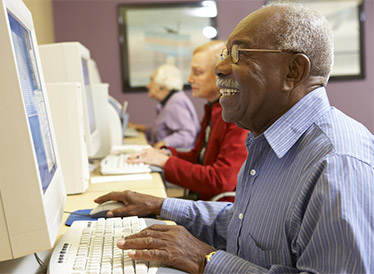How to transfer money and make payments
You can send money from your bank account to someone else's using a bank transfer. Transferring money in this way is...
Online banking allows you to keep control of your finances from home or whilst you're out and about on your bank's website or smartphone app. There are measures you can take to help keep your money and identity safe when using online banking.
To access online banking, you must already have an account with the relevant bank. If you do, you'll then need to register online via your bank's website. The safest way to find your bank's website is to enter the web address as it's printed on a piece of communcation from your bank (such as a bank statement or letter).
How you set up online banking may vary slightly depending on your bank. You can phone your bank to enquire about their particular process, but it may include some of the following steps:
Most banks also have their own smartphone and tablet apps, so once you've set up online banking, you can download your bank's app. This allows you to do things like check your balance and send payments. If you have an Android phone or tablet, you can find banking apps in the Google Play Store. If you have an Apple phone or tablet, you can find banking apps in the App Store.
Unfortunately, there are a lot of fake banking apps available to download, so it's a good idea to check that you're downloading the bank or building society's genuine app. Visit their website and go to the app download page through there. You can always call your bank if you're at all unsure.
With most banks, you can use online banking to:
Click here to find out more about transferring money safely and securely

Many of our local Age UKs provide computer and IT training, to make getting online straightforward and enjoyable.
One of the benefits of online banking is that you can quickly and easily check your bank statements, as well as any upcoming transactions on your account.
If you want to, you'll still receive monthly bank statements in the post. Or you can opt to go 'paperless' and receive statements by email or download them from your online account.
There are adaptations available if you have a visual or hearing impairment. For example, many banking apps are compatible with smartphone and tablet accessibility features that you may have already set up on your phone, such as the read-aloud function or inverted screen colours.
Click here to find out more about making your device easier to use and more accesible
I check my bank statements to make sure none of my money is going anywhere I don’t want it to.
Generally, online banking is safe, but there are steps you can take to look after your money and identity:
There's a common scam where criminals call people and tell them their account has been hacked and that they need to move money into a 'safe' account. These criminals can even use technology that makes it look like they're phoning from official bank numbers.
Remember – your bank will never phone you out of the blue, ask you for your PIN number or password, or ask you to transfer money into a different account.
If you're at all worried, hang up and get in touch with your bank.
Banks take the security of accounts very seriously and invest lots of time and money to make sure your online account is safe. Some of the ways they do this include:
We offer support through our free advice line on 0800 678 1602. Lines are open 8am-7pm, 365 days a year. We also have specialist advisers at over 120 local Age UKs.
You can send money from your bank account to someone else's using a bank transfer. Transferring money in this way is...
Protect yourself by knowing what to look out for.
Email is electronic mail. It's a free and easy way to stay in touch with family and friends. You'll need an email...
Our A-Z of online terms explains what they all mean.
Shopping online is quick and convenient – it can be done from the comfort of your own home, or even when you're out...
Apps, or applications, are a type of program that you download to your smartphone, tablet or computer. There are...